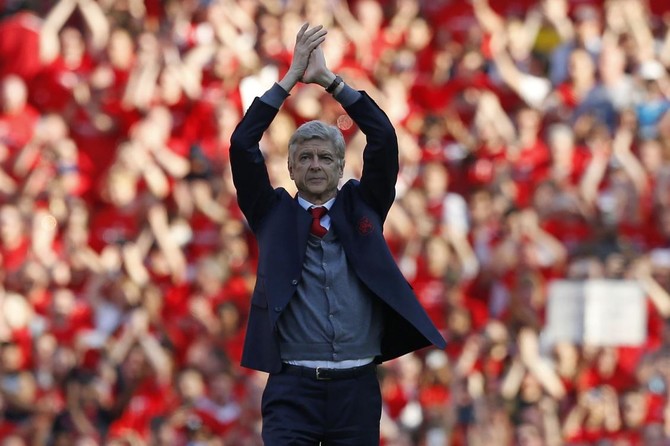LONDON: As chants of “One Arsene Wenger” rang out around the Emirates Stadium on Sunday afternoon — where the Gunners ruthlessly dismantled Burnley in a performance reminiscent of Wenger’s heyday — one had to question the hypocrisy of Arsenal supporters.
A matter of weeks before, a toxic atmosphere swept around the terraces of Arsenal’s glittering north London home almost every game. The fans had consistently turned on their manager in a spectacular display of vitriol and anger. The fact that a club legend like Wenger had suffered this ignominy for month after month shows how little the Arsenal fans wanted him in the hot seat.
So, to hear the gushing praise trickle down from the Arsenal faithful suggested one of two things. Either the naysayers and the ‘#WengerOut’ brigade had stayed away for the final home game of his remarkable 22-year career, or those who had once called for Wenger’s head quickly changed their tune once he offered it himself on a silver platter.
To the rest of the world, it reeked of two-faced duplicity.
Wenger is one of the last of a near-extinct breed: Namely, a manager who stayed more than three seasons. A manager who created a footballing culture that became synonymous with the club he ran. A manager who bucked the trend and took risks in the quest for success. A manager who defined the very essence of his club.
We should remember that the classy, bespectacled Frenchman was a unique specimen when he arrived at Arsenal back in 1996. The very few foreign managers who had dared to manage an English club before him had failed. Yet Wenger brought with him not only a footballing ideology, but a new approach to the professional game. After Wenger’s almost-instant success, it was not long before the English top flight was littered with European or South American coaches also equipped with “diet plans” and “quirky systems” different to the stale, tired English 4-4-2.
Wenger’s impact on the game in England was as seismic as Herbert Chapman’s WM formation change at Arsenal in the 1930s, the advent of the offside rule, or the introduction of the Premier League itself.
And his impact on Arsenal will never be forgotten. He transformed the club from occasional, plucky victors into one of the world’s most recognizable football clubs.
For all the sighs of relief and teary-eyed farewells from Arsenal fans at the Emirates at the weekend, there will be a sense of uncertainty surrounding the Gunners this summer. Just as Manchester United fans painfully pondered after Sir Alex Ferguson retired, Arsenal fans may well be asking themselves “Who can replace such a legend?”
Arsenal had the last of an ever-disappearing species — a manager able to craft teams and build a reign of all-conquering success over decades. But Wenger became a man who was left behind by the rapidly-changing landscape of top-level English football. It could well turn out that Arsenal fans rue hounding Wenger out of their club. What is certain, however, is that world football has lost its last bastion of great, dynastic managers.
And it feels all the poorer for it.
























